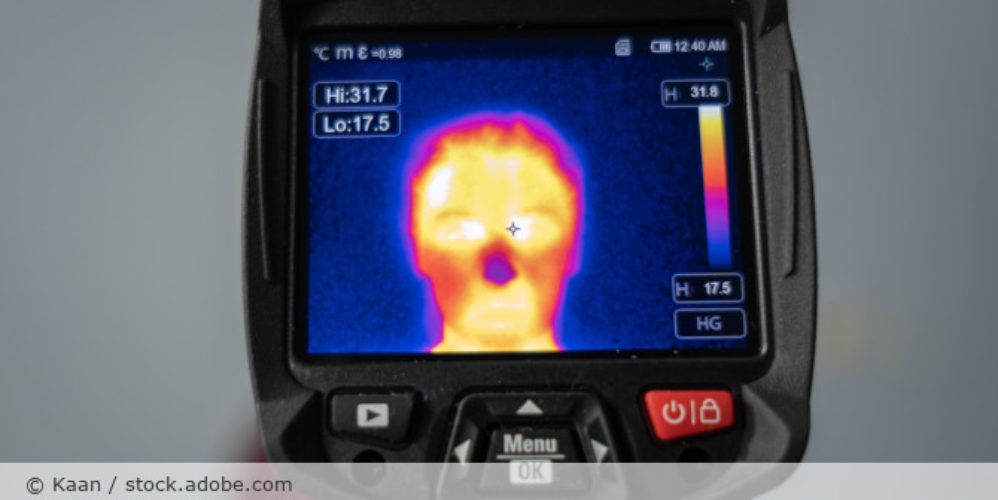According to the French Conseil d’Etat: No!
In order to combat Covid-19, the French municipality of Lisses installed one fixed thermal camera in a municipal building that was able to report excessive body temperatures. Additionally, several portable thermal cameras were entrusted to municipal officials who at the entrance of schools could measure excessive temperatures of students, teachers or other municipal staff. When an abnormal difference in temperature was found, teachers and municipal staff were asked to leave the building and students were to be picked up by their parents immediately.
The ‘League for Human Rights’ (‘Ligue des droits de l’Homme’) challenged this and petitioned to the interim relief judge of the Versailles Administrative Court to suspend the measures on the basis of L 521-2 of the code of Administrative Justice (‘CAJ’). The judge of first instance rejected the request which is why the Human Rights NGO appealed the order before the Council of State (‘Conseil d’Etat’).
Conseil d’Etat Ruling
Fixed Camera
With regards to the fixed camera, the Council of State clarified that the camera does not record anything as it does not have any memory capacity. Furthermore, it is a voluntary decision of any person entering the municipal building to place him or herself in the space allowing the operation of the thermal camera. There are therefore no adverse consequences if a person enters the building and chooses to not subject him or herself to the capturing of the thermal camera. Consequently, when it comes to the fixed thermal camera, the Court concluded that the thermal camera cannot be regarded as giving rise to the processing of personal data as established in the GDPR.
Portable Cameras
However, in regards to the portable cameras, the Court stated that they are being used not only at the beginning of the school day but also during the school day, to measure the body temperatures of students, teachers and municipal staff working on school premises. The collection of health data in this way by the thermal cameras constitutes processing within the meaning of art. 4 of the GDPR. Moreover, this type of processing, which collects temperature data and then displays the existence or absence of a deviation from normal temperatures, is automated. That is because the cameras instantly display the contours of a human body together with a colour code that indicates any body temperature deviations.
The Court emphasized that it is possible that the image processed by the system, even if not stored, may be sufficiently accurate to identify a person. That combined with the way in which the cameras are implemented led the court to define the processed data as ‘personal data’ within the meaning of the GDPR.
Absence of any legal basis
The Court clarified that none of the legal basis which would justify the processing of personal health data mentioned in art.9 GDPR were met as there was i.e. no written statement governing the use of thermal cameras and specifying the public interest (art.9 (2) (g)). Moreover, the Court rejected the municipality’s argument that consent within the meaning of art. 9(2)(a) GDPR was obtained, as the municipality was not able to show that this consent was actually collected, kept and consulted before the treatment was carried out for each child. Nor that it was given specifically for the treatment, containing all the necessary information, in particular as regards the exercise of the rights of access, rectification, objection or the possibility of withdrawing consent. In any case, the Court outlined that the fact that children’s access to the school is subject to acceptance of the use of temperature taking by thermal camera, rules out the possibility that consent may be regarded as free.
Conclusion
The Court ruled that the infringement of fundamental freedoms resulting from the processing of personal health data as part of the portable camera capturing, was manifestly unlawful and therefore deemed the use of the powers referred to in Article L 521-2 of the Code of Administrative Justice as justified. Moreover, it clarified that the Ligue des droits de l’homme is entitled to argue that it is wrong that, by the order under appeal, the interim relief judge of the Versailles Administrative Court rejected its conclusions to suspend the deployment of these portable thermal imaging cameras.
Accordingly, the Court annulled that order and ordered the commune of Lisses to put an immediate end to the use of portable thermal imaging cameras deployed in schools.
The full judgment (in French) can be accessed here: https://www.conseil-etat.fr/ressources/decisions-contentieuses/dernieres-decisions-importantes/conseil-d-etat-26-juin-2020-cameras-thermiques-a-lisses






23. Juli 2020 @ 13:14
Es sollte dabei datenschutzrechtlich auch beachtet werden, dass Wärmebildkameras nicht nur WÄRMEBILDER, sondern auch NORMALE BILDER machen und speichern!